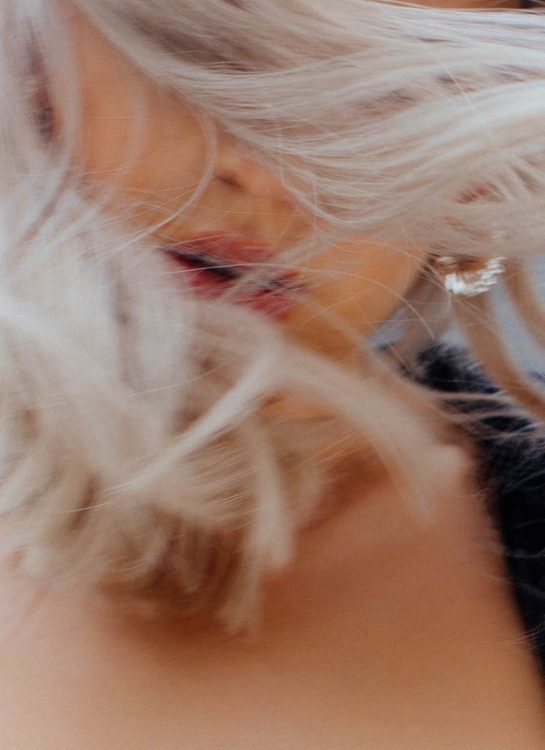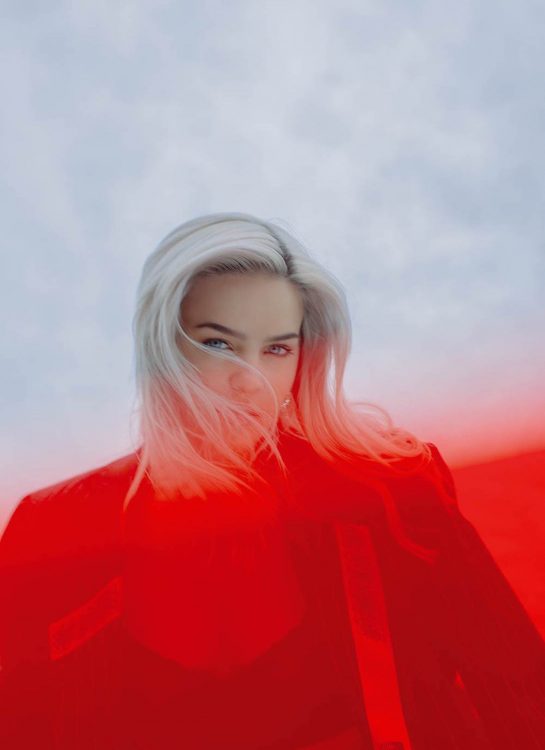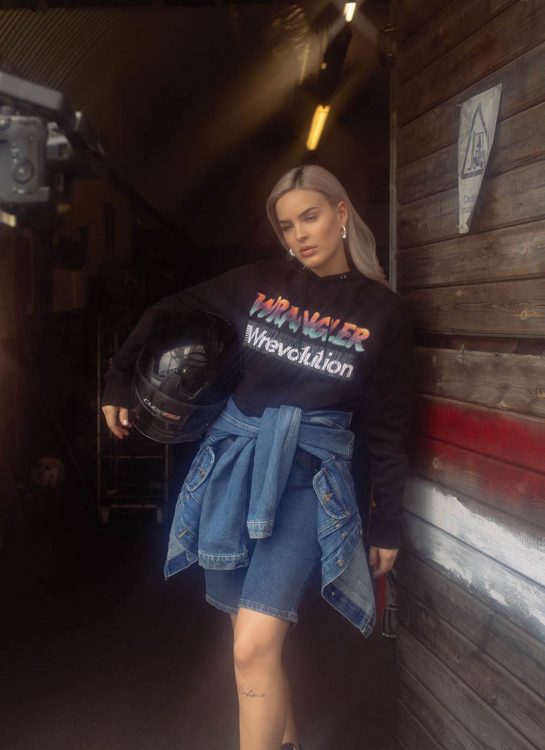In collaboration with

- Words Notion Staff
- Photography Turkina Faso
- Fashion Poppie Clinch
- Fashion Millie McMahon
- Hair Kim Roy @ One Represents using Hair Rituel by Sisley
- Makeup Emma Osborne @ One Represents using MAC Cosmetics
- Photography Assistant Stanislav Ivanov
- Fashion Assistant Nina Nadine Ossmann
- Thanks to Revolution Karting
Taken from Notion 80, read our full feature with Anne-Marie online for the first time.
Multi-platinum selling, award-winning, top trending vocalist and songwriter Anne-Marie doesn’t seem comfortable in her own skin. However, dewy skinned, porcelain complexioned with sparkling blue eyes and a cherub-like pout, world-class karate champion turned musician, Anne-Marie Rose Nicholson is stunning. Stooped over, wearing a baggy red tee on a Tuesday afternoon, she is explaining that her main priority is that the world might understand she is just like you or I. Setting the chart music world on fire with her Midas touch creative capabilities, every track this 27-year-old Essex native fires out racks up million figure plays. Whether Anne-Marie is collaborating with rapper Joey Bada$$ on Snakehips’ track or Clean Bandit and Sean Paul on baby mama love song ‘Rock a Bye’, either way, a stirring, relatable aesthetic comes to mind with the very sound of her distinctive realist, sing-song voice.
In reality, Anne-Marie is nothing like you nor I. Formally lead vocalist in the Asylum signed drum and bass badman outfit Rudimental, tomboy Anne-Marie has spent the past four years on tour. Kept constantly busy by either performing with her former and fellow multi-platinum selling band, playing support to good mate and music maker Ed Sheeran and headlining her own international schedule, Anne-Marie is an overachiever. Only ever truly at ease on stage, the statuesque, self-critic only feels safe behind a mic, addressing crowds of thousands. Yet she recounts to me how, just yesterday, when walking across a street, being alone, while waiting for her car to collect her was overcome by a state of huge angst and anxiety. Witnessing Anne-Marie sass to the camera in her music videos or belting out one of her attitude-heavy anthems betrays an incredibly in-control and powerful woman, one fully aware of both her beauty and strength. However, for years Anne-Marie has battled with the inability to accept herself or recognise the elegance of her own reflection.
In Anne-Marie’s company, I feel engaged and connected. Her humility and her coy nature are wonderfully compelling. She is genuinely blind to her own beauty, while the world basks in and dances to her dulcet melodies. She cringes when one of her number one singles blasts out, coincidentally, on the radio.

- Earrings Sacred Hawk

- All clothing Wrangler
Describing herself as an empath, Anne-Marie tells me how she instinctively embodies the mood of a crowd or a person she meets. She can process the energy of another individual regardless of whether they are interacting with her. Ironically, when chatting candidly about her vulnerability and intense emotions, what she provokes, in turn, is respective, heartfelt empathy.
On Speak Your Mind Anne-Marie’s aim to allow everyone to feel unionised by her and their insecurities is palpable. On one track ‘Machine’ Anne-Marie describes her experiences struggling to cope with how she filters reality, unable to turn off her overactive imagination. In truth, her 14-track debut LP Speak Your Mind, released this month, eloquently communicates how toxic relationships and the war in her mind torture her daily. Deviating only once to release upbeat pop track ‘2002’, co-written with Ed Sheeran, Anne-Marie’s diverse and dynamic talents feel generally unpredictable. Already musing on her second LP, the Warner Brothers-signed singer discusses her desire to create something which will spread happiness to everyone she encounters, her ultimate career ambition.
Wrapping up our conversation, accelerating her speech to fit in everything she has to say to me, the husky-voiced songstress explains that she finds sleep stifling mainly because she reasons ‘why lie still when you could be moving forward’. A testament to everything that she has achieved in such a short space of time, Anne-Marie reminds me that she has been competing in talent competitions since she was a girl and has earned her time in the spotlight, and not fortuitously stumbled upon it. With that, she leaves me to commute to the next city for another show and a fresh sea of adoring eyes.

- Top Gucci
- Skirt House of Holland
- Sunglasses Stylist's Own
- Jewellery Topshop

- Blazer House of Holland
- Bralet Intimissimi
- Earrings Sacred Hawk
Where do you find the greatest forms of validation?
The most important thing for me with this album is that people like it and enjoy it. That they want to tweet me and let me know that they are dancing to it. I feel good that I help people to feel good about themselves and make them feel happy. It’s as if a song helps them through a certain situation that helps them forget everything bad.
Given that you have that tendency to internalise negative self-beliefs and feel insecure, how do you cope with being on shoots and being on stage?
It’s quite scary, honestly. It’s during photo shoots that I feel most insecure. That’s mainly because people know me from Instagram. Online I can make myself look really good in photographs because I have control of good light and l can look at every option before I post one, so when l get to a photoshoot I have this fear that people are expecting me to look a certain way and I worry l look disgusting. I think that in life I have an issue with a self-image, so that’s just me in general.
So these issues existed before being spotlighted for your music?
I’m not sure when it started, I just remember being very aware I didn’t like what I looked like. I can’t understand where that came from, my family are very lovely people, and they have never made me feel like I should look a certain way. Maybe in Essex, we wanted to look as good as the women in magazines but, from a young age, it was hard. When I started maturing things got a little bit easier, but when you have a deep disdain for yourself, it doesn’t just go away. It’s a constant battle. That’s why I try to promote self-love to people because I struggle with myself and I don’t want people to feel the way I do. I try to help people realise they are not alone.
You’ve said in interviews before you have been cheated on in every relationship. Are you drawn to people who reinforce your negative self-values?
No, I think now l warm towards people who I know are good people and I feel like I can spot when someone is not going to be good for me, or their energy is bad, so definitely not anymore.
Did you choose to be a performer because the idea of being in front of an audience, entirely exposed and then receiving love back is a therapeutic process in itself?
I went into performing because love music and I love to write. It wasn’t until recently I was speaking to someone and they said to me ‘do you think you love performing so much because you feel other people’s energy and you draw so much on that, for example, their facial expressions excited by the music, is that why you perform?’ Usually, at a gig people are smiling so I must get that feeling from the crowd, reacting to the happiness I sense. That’s maybe like an addiction, I love to see those faces and that’s what I see when l am on stage.
You describe yourself as a hypersensitive person, yet you appear so fluid and confident on stage. It must be overwhelming to receive all of the energy you experience on stage and remain calm and focused whilst performing?
I‘ve never really understood how I manage to be so composed on stage. Even when I was younger, when I was performing on local talent shows I would be absolutely shitting myself, and the people who were judging would tell me I came across so confident and never knew how I did it. When I’m on stage, that is the only time I feel normal, and that’s really the opposite to everyone else. You might feel comfortable in everyday life, but if you’re on stage, you would feel exposed. But I experience those situations in reverse. I’m happier on stage.
When you’re on stage why do you feel so compelled to interact and not just go from song to song?
I don’t just want to be seen as a singer, I want to be seen as an artist. I want to be seen as someone who actually cares about what people think of the performance. I want people to enjoy it. Maybe because of the artists who I admired when I was younger, like Alanis Morrissette and Lauryn Hill, they were the whole package, they had that extra something. I have tried just working my way from song to song. I’ve tried it because I was so nervous to speak at the start. I wanted to just sing, but I didn’t feel that complete when I came off stage. I had to grow more confidence to speak to people, but I did feel that offering myself to people in that way adds to the show. It allows my fans to get to know me as well as their songs. When I am on stage I want to give them my personality and for them to realise that I am just like them.

- Blazer House of Holland
- Earrings Sacred Hawk

- All Clothing Wrangler
What do you hope people discover about your personality from your shows?
That I am just like them, I don’t want them to think that I am an unreachable, untouchable pop star. I don’t feel like that so I don’t want them to believe that. I worked for a long time before I got here and l have a lot of say in what I do, the music I make and who I work with. I am a bit of a control freak and I think that’s what allows me to not get lost, I don’t just leave decisions up to my label or management, I have control over a lot of elements. It’s all still me.
99% of top-tier music managers and label honchos are male. How do you deal with that?
To be honest, I never feel intimidated in front of men, being outnumbered by the opposite gender makes me get even more confident. I don’t know why. My label is unique. There are a lot of women who work there, and my manager is a woman; I want to surround myself with women. I have freedom. If there were an agenda, I would have been forced to become something more commercial and predefined years ago, in truth they have allowed me to come of age as myself.
You touch upon bisexuality on your album. With tracks like Rita Ora’s ‘Girls’, female sexuality is becoming more fluid and topical and I wondered why you thought that was?
With my song l say, ‘I love who I want to love because this love is gender-free’ and that is exactly what I want to say. I don’t want to be labelled as something. I’ve never said I am bisexual. I want to celebrate everyone loving each other and I felt strongly about putting that in a song and the more people that feel open about their sexuality the better. For me, it’s important for me to talk about everything; insecurity, sexuality. I don’t want to be opposed to talking about something in case it gets a reaction. I’ve never been that way. I have always been outspoken.
When you go around your day-to-day life are you always aware of how you are processing emotions or experiencing situations, from a creative songwriting perspective?
Yeah, that was also something that I had to learn how to capture. I used to be thinking about my friends, or going home and watching Eastenders, just normal thoughts. I remember someone saying to me if you want to make it in the music industry, your brain has to be switched on to music and that is it. I wasn’t sure how l was going to do that, because I am usually just preoccupied with Nandos! Now it has become all about music. It’s always in my head.
Some artists are able to take someone with them when they tour or travel to allow them a sense of grounding and familiarity.
I have my band, and I have Beanie who was Rudimental’s drummer and I stole him. I was nervous leaving that whole movement of Rudimental and going it alone, and as soon as I met Beanie, we became really good friends. As soon as he left the band I said to him you have to be with me because you will make me feel so calm onstage, so he is with me. He still plays with them also.
What’s a typical day like on tour?
Depends if I have promo that day. If I do, I wake up early and go to the radio station all day, then sound check at the venue, then I do the show. The difficult thing is after the show. I can’t normally sleep once I step off the stage and the adrenaline is intense. I don’t really sleep. I feel like I can sleep in the day, but at night I feel like I am wasting time and losing out on opportunities. The night is a time when I can reflect and really think. In the day so much is happening that I can’t. When evening comes, I will go through everything I have needed to think about in a whole week over the course of the night. The thought of laying still for eight hours scares me.
Do you feel like you have a lot to achieve?
Yes, I feel like I need to do so much while I’m alive. I feel like I need to help people and enable people to achieve a better life. I have not even started to do that. When I talk about this with my mates, they tell me I am helping people through my music, but it is hard with music, because the only time you get the sense of that is when you see someone in the crowd for a split second. That is the reward of your work. Another example is when someone tweets you. But if you are working in a homeless shelter or a kids centre, you feel it all the time.
You’ve mentioned a few pals during this interview and they’ve all been lads. Is your friendship circle mainly male?
Yeah, always has been. I overthink. I think very deeply. For example, if there’s a normal thought that everyone has and they drift into it, I go ten layers deep into the thought. When I was younger, and it came to girl friends, I always felt like they were thinking bad of me. I didn’t want that. When I hung out with boys, I felt like it was [more] straightforward. I just thought ‘sweet’, but you know the girls may not have been thinking what I thought they were. It could have all been my issue. I have way more girl friends now but before it was a struggle.
Now, this album finished, is there anything specific you want to achieve with the next one?
I want it to be different. I still want to be writing realness, about real life situations and stories because that’s what people know me for, and I love that, but I definitely want to surprise people. I am always changing and learning about myself as a person. I’m understanding the world more, and I think that will always reflect in my music, so when people ask me what genre I make, I tell them I have no idea!
Anne-Marie’s Speak Your Mind LP is out now.

